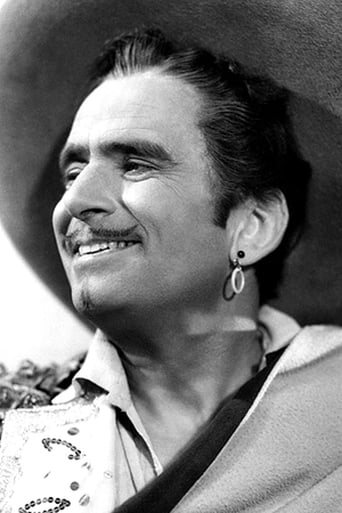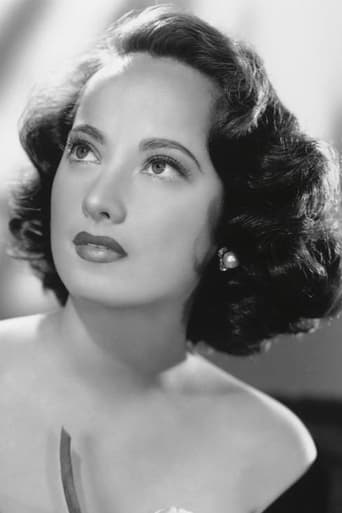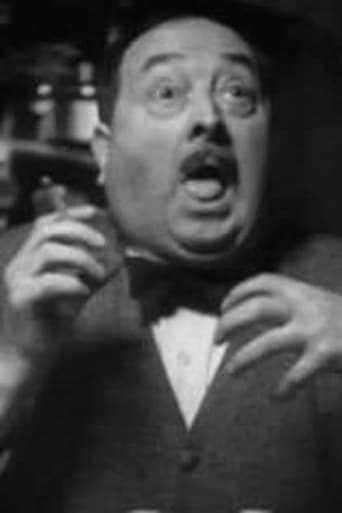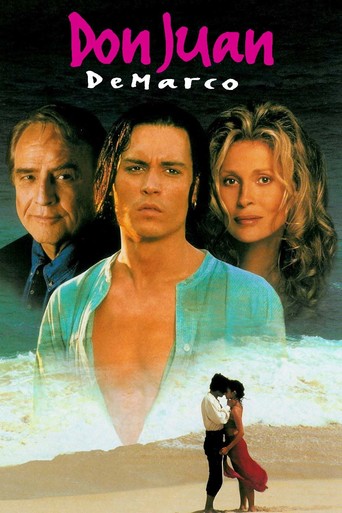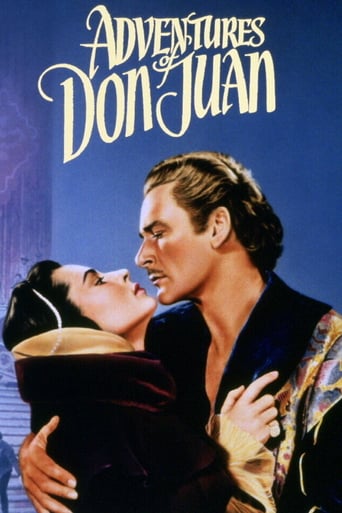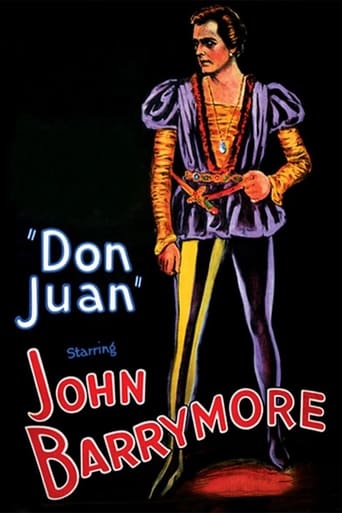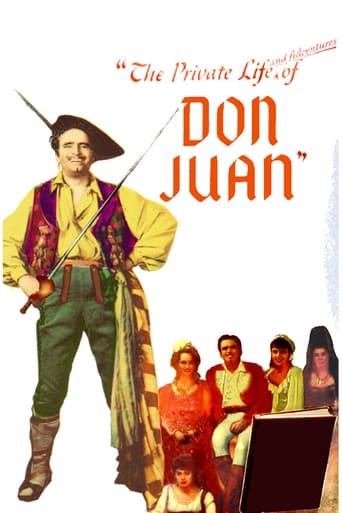
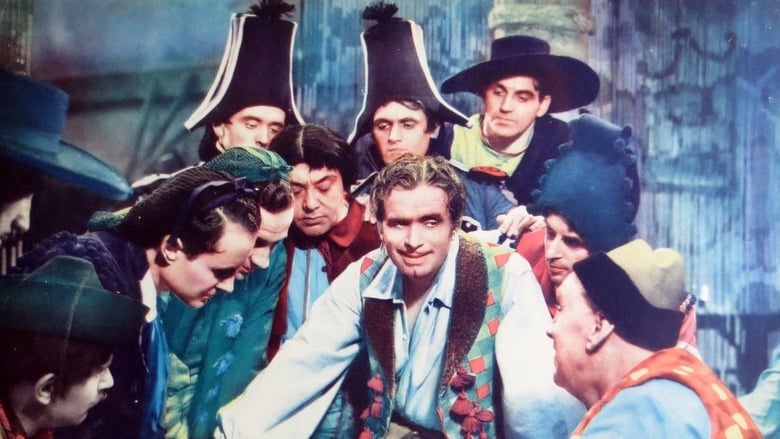
The Private Life of Don Juan (1934)
What do women want? Don Juan is aging. He's arrived secretly in Seville after a 20 year absence. His wife Dolores, whom he hasn't lived with in five years, still loves him. He refuses to see her; he fears the life of a husband. She has bought his debts and will remand him to jail for two years if he won't come to her. Meanwhile, an impostor is climbing the balconies of Seville claiming to be Don Juan.
Watch Trailer
Cast


Similar titles
Reviews
Sadly Over-hyped
Good story, Not enough for a whole film
It's funny, it's tense, it features two great performances from two actors and the director expertly creates a web of odd tension where you actually don't know what is happening for the majority of the run time.
The acting in this movie is really good.
"The Private Life of Don Juan" is a 1934 comedy from Alexander Korda and is notable as the swan song of screen legend Douglas Fairbanks. The Don Juan character comes from a 14th Century Spanish play, several books and plays (including works by Byron and Moliere) and the Mozart opera Don Giovanni (1787). The first film was in 1926 starring John Barrymore. Don Juan would be played later by Errol Flynn (1949) and Johnny Depp (1995).Douglas Fairbanks Sr. was one of the biggest stars in the early years of Hollywood, referred to as "The King" of Hollywood. Along with Chaplin, DW Griffith, and Fairbank's wife, Mary Pickford, he founded United Artists (1919). He founded the Motion Picture Academy (1927) and was its first President, was the first to put his hands and feet in the cement at Grauman's Chinese Theatre, and hosted the first Oscar ceremony in 1929.Fairbanks virtually invented the swashbuckler film and appeared in such classics as "The Three Musketeers" (1921), "Robin Hood" (1922), and "The Thief of Bagdad" (1924). He wasn't really known for his lothario roles, which were more the focus for his contemporaries Valentino and Barrymore.Fairbanks was in England along with his son, looking for work, when he came upon Alexander Korda and hence this film. Korda loved film biographies - "The Private Life of Henry VIII" (1933), "The Private Life of Helen of Troy" (1927), "Rembrandt" (1936), "That Hamilton Woman" (1941), and "Bonnie Prince Charlie" (1948) – and while the character Don Juan is more fiction than fact, he was so well known it does take on an historical toneMerle Oberon plays one of Fairbank's love interests. She started in films in 1928 but it was her role as Anne Boleyn opposite Charles Laughton in Korda's "The Private Life of Henry VIII" (1933) that brought her to stardom. She was nominated for an Oscar for "The Dark Angel" (1935) but is probably best remembered for her role as Cathy in "Wuthering Heights" (1938). Oberon appeared in several Korda films and eventually they married in 1939 and then divorced in 1945 when she married cinematographer Lucien Ballard.Binnie Barnes plays a maid. Barnes was a major star of the 30s, appearing in "Private Life of Henry VIII" (1933), "Diamond Jim" (1935), "Last of the Mohicans" (1936) and "3 Musketeers" (1939). Her philosophy was - "I'm no Sarah Bernhardt. One picture is just like another to me as long as I don't have to be a sweet woman."French born Georges Perinal (1897-1965) is the photographer. He worked often with Korda (Henry VIII, Rembrandt, Catherine the Great) and won an Oscar for "The Thief of Bagdad" (1940) and was nominated for "Four Feathers" (1939).The NY Times called the film "a visually attractive costume comedy" but disliked Fairbanks' performance noting - "the microphone is ruthlessly unkind to him. Neither in voice nor theatrical skill is he gifted to read lines."1934 was an OK year for films. The top box office slots went to "Viva Villa", "Cleopatra" and "The Barretts of Wimpole Street" and "It Happened One Night" was the big Oscar winner. That year "The Thin Man" series began, Karloff and Lugosi appeared in "The Black Cat", Fred Astaire and Ginger Rogers danced in "The Gay Divorcée", Laurel and Hardy laughed it up in "Babes in Toyland", and Howard Hawks' "Twentieth Century" came out.The aging Fairbanks is marvelous as the aging lothario, and one can't help but make comparisons with John Wayne's "The Shootist" (1976), Edward G Robinson's "Soylent Green"(1973), Errol Flynn's "Too Much too Soon" (1958) or John Barrymore's "The Great Man Votes" (1939). Fairbanks is particularly good when philosophizing about the vagaries of fame and the problems of growing old.This isn't the best film, but it is an opportunity to see the famous Douglas Fairbanks in a talkie and in a role that requires acting rather than swashbuckling alone. His voice is a bit disappointing and his acting skills are not terrific, though they are certainly acceptable. He is surprisingly agile as the 52 year old demonstrates throughout the film. Although his contemporaries were disappointed, the passage of time lets us evaluate him more appropriately.
Returning old and in debt to Seville, the scene of his youthful triumphs, Douglas Fairbanks Snr as the Don finds a young impostor climbing less adroitly up balconies to get at the city's wives. When the inept lad is run through by a husband, Don Juan enjoys attending his own funeral but is persuaded by Melville Cooper, his sardonic sidekick Leporello, to disappear under an alias to Portugal. Bored and unsuccessful with women there, he leaves when the even-older owner of the inn, Athene Seyler, proposes. Back in Seville, nobody believes that this strange elderly man is the dead Don Juan and he is universally taken for another impostor, even by old flames. Among the host of lovely women it is invidious to pick out Merle Oberon as a gloriously seductive dancer Antonita, Benita Hume as his abandoned but still faithful wife Doña Dolores and Binnie Barnes as a gawky barmaid Rosita. The whole film is tongue-in-cheek, with nobody taking themselves seriously and all acting with Latin extravagance. Picturesque costumes are about 1805, based on Goya's paintings, and there are some ambitious sets. Fine soundtrack throughout, with an opening serenade "Senorita Carmencita" and a running motif of "La Paloma". Good entertainment!
When this film began, I was very suspicious about the casting of the aging Douglas Fairbanks in this film. After all, he was supposed to be playing Don Juan--the famed lover. Yet here was Fairbanks--clearly middle-aged, with thinning hair and a less than impressive physique. In fact, this turned out to be his last film--dying just five years later. So I KNEW this couldn't possibly work...or so I thought. However, the plot actually worked because in the film, Don Juan was supposed to be past his prime--it's just that he and his adoring public didn't yet know it! The film begins with Don Juan adored by the masses of married women who he has been seducing and flattering. However, his doctor is concerned--his patient isn't as young as he used to be and he needs to slow down. At first Don Juan is skeptical, but when his servant is murdered by a man who THOUGHT this was Don Juan, the aging philanderer makes the most of it--and allows the world to think he is dead. Then, he can retire and take life easy. However, after a while, he finds this life a bit dull--and the ladies are less than impressed by this anonymous man. So he decides to go public--admit he's alive and resume his wicked ways. The problem, however, is that the Don Juan of legend is just too sexy and too appealing--and no one believes this aging man is this rake! The film has a neat message, nice costumes and a few flashes of the old Fairbanks as he scampers up the side of a building to woo a willing lass. While not a great film, it was a nice farewell for the world-famous leading man. I saw this on the recent Criterion release, but as it had absolutely no special features on the disk, you might just want to watch it or download it from the IMDb link--something you can do with many of director Alexander Korda's films.
In Douglas Fairbanks, Jr.'s memoirs, he and his father decided in 1933 to go over to Great Britain together for work. Fairbanks the younger wasn't satisfied with his film career at Warner Brothers and his father was falling head over heels with the British Lady Sylvia Ashley. She became his third and last wife. Doug Jr. said that they bonded while there closer than they did while he was a child.Doug Jr. did a bunch of films and some stage work in London, his best known film in his British period was Catherine the Great with Elizabeth Bergner. Doug, Sr. did this one film, The Private Life of Don Juan and it's as tailor made a farewell to the screen as The Shootist was for John Wayne.We all of us get older and even such sex symbols as Don Juan does. He's wearying of the life and I suspect has not the stamina any more for what he was known for. When rumor goes around he's been killed finally by an irate husband, Fairbanks decides with his faithful man Friday, Leporello, played by Melville Cooper to take a long needed rest.The problem comes when he decides to make a comeback and no one believes this 51 year old man is the real Don Juan. Fairbanks was 51 when he made The Private Life of Don Juan and he did look pretty good for a 51 year old man. At least I didn't look as good when I hit that age. What will the outcome be for the aged Lothario? For that you'll have to see the film and I will say that Alexander Korda provided a nice bevy of British beauties for Fairbanks to choose from. Such beautiful and talented folks as Merle Oberon, Benita Hume, Binnie Barnes, and Diana Napier all vie for Fairbanks's attention at one point in the film.Best in the film however is Athene Seyler and her proposition to Fairbanks. Her scene with him is a delight.I don't know if Fairbanks had it in his head that The Private Life of Don Juan would be his farewell picture. It needn't have been, his speaking voice registered well for sound and by 1934 he wasn't overacting as many of his silent contemporaries did and ruined their careers thereby. But The Private Life of Don Juan was perfect as a farewell performance for a man who was an American icon in his day, as much as John Wayne was in his.


